 SAFETY ALERT – If you are in danger, call or text 911.
SAFETY ALERT – If you are in danger, call or text 911.
 We define rape culture as an environment where sexual violence is normalized, ignored, trivialized, or excused due to societal attitudes about gender, power, and sexuality. It describes a culture in which harmful beliefs, behaviors, and systemic inequalities contribute to the prevalence of sexual violence and make it easier for those acts to happen while minimizing accountability for people who inflict sexual violence on others and silencing or blaming survivors. Learn more about how our society makes rape culture acceptable and what we can do to change this.
We define rape culture as an environment where sexual violence is normalized, ignored, trivialized, or excused due to societal attitudes about gender, power, and sexuality. It describes a culture in which harmful beliefs, behaviors, and systemic inequalities contribute to the prevalence of sexual violence and make it easier for those acts to happen while minimizing accountability for people who inflict sexual violence on others and silencing or blaming survivors. Learn more about how our society makes rape culture acceptable and what we can do to change this.
 Love bombing is a form of emotional abuse where an individual intent on causing harm showers a new partner with excessive attention, affection, compliments, declarations of love, and gifts to create an intense emotional bond and a sense of urgency and dependence, which then paves the way for manipulation once the partner is “hooked.” There might also be attempts to isolate the partner from family and friends, ultimately making the victim lose their sense of self within the relationship. Check out these signs.
Love bombing is a form of emotional abuse where an individual intent on causing harm showers a new partner with excessive attention, affection, compliments, declarations of love, and gifts to create an intense emotional bond and a sense of urgency and dependence, which then paves the way for manipulation once the partner is “hooked.” There might also be attempts to isolate the partner from family and friends, ultimately making the victim lose their sense of self within the relationship. Check out these signs.
 Campus violence is a legitimate worry for the roughly 72 million students enrolled in colleges and universities in this country. That violence includes sexual violence. Studies show if you're a college student or college-age adult, you're at particularly high risk of being sexually assaulted, likely by someone you know. Learn more about campus safety.
Campus violence is a legitimate worry for the roughly 72 million students enrolled in colleges and universities in this country. That violence includes sexual violence. Studies show if you're a college student or college-age adult, you're at particularly high risk of being sexually assaulted, likely by someone you know. Learn more about campus safety.
.png) Lesbian, gay, bisexual, transgender, queer/questioning individuals experience intimate partner violence at higher rates than heterosexual and cisgender people due to stigma and barriers to accessing support. If you or someone you care about is a member of the LGBTQIA+ community and have experienced sexual assault or domestic violence, you are not alone and there is help available through these resources.
Lesbian, gay, bisexual, transgender, queer/questioning individuals experience intimate partner violence at higher rates than heterosexual and cisgender people due to stigma and barriers to accessing support. If you or someone you care about is a member of the LGBTQIA+ community and have experienced sexual assault or domestic violence, you are not alone and there is help available through these resources.
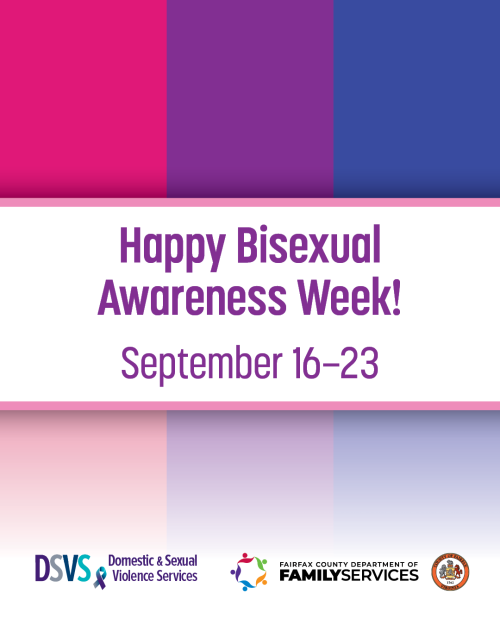 Bisexual Awareness Week (September 16-23) is an annual event that focuses on bisexual people and their experiences, which are often overlooked or erased from conversations about the LGBTQ+ community. Bisexual erasure, a form of discrimination, can be assumptions that bisexual people are “just confused;” promote stereotypes that they are either gay or straight, depending on the partner they are with; or manifest in the form of a lack of representation in the media, jokes, or ignoring their stories and experiences. This invisibility can have serious consequences for bisexual people's mental and physical health, leading to feelings of isolation. It also puts bisexuals at increased risk of intimate partner violence. Learn more about this observance.
Bisexual Awareness Week (September 16-23) is an annual event that focuses on bisexual people and their experiences, which are often overlooked or erased from conversations about the LGBTQ+ community. Bisexual erasure, a form of discrimination, can be assumptions that bisexual people are “just confused;” promote stereotypes that they are either gay or straight, depending on the partner they are with; or manifest in the form of a lack of representation in the media, jokes, or ignoring their stories and experiences. This invisibility can have serious consequences for bisexual people's mental and physical health, leading to feelings of isolation. It also puts bisexuals at increased risk of intimate partner violence. Learn more about this observance.
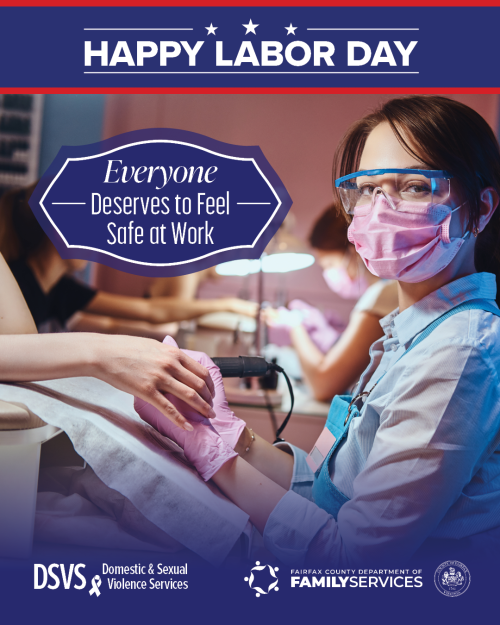 On Monday, Sept. 1, 2025, we celebrate the rights and freedom from exploitation in the workplace, including sexual harassment, discrimination, trafficking, and wage theft (unpaid overtime, denying breaks, or not paying minimum wage). Everyone deserves to have a safe and healthy home and work environment. If you've faced sexual harassment at work or someone in your family is controlling your finances, Domestic and Sexual Violence Services can support you. Learn more about harassment or call the Domestic and Sexual Violence 24-Hour Hotline at 703-360-7273.
On Monday, Sept. 1, 2025, we celebrate the rights and freedom from exploitation in the workplace, including sexual harassment, discrimination, trafficking, and wage theft (unpaid overtime, denying breaks, or not paying minimum wage). Everyone deserves to have a safe and healthy home and work environment. If you've faced sexual harassment at work or someone in your family is controlling your finances, Domestic and Sexual Violence Services can support you. Learn more about harassment or call the Domestic and Sexual Violence 24-Hour Hotline at 703-360-7273.
When Domestic and Sexual Violence Services administrative assistant Chi Sook Park found out she is one of the five admins across Fairfax County Government to be awarded the 2025 Sharon Bulova Award for Exemplary Administrative Professionals, she was stunned. “It’s a really valuable award,” she says. “I never thought I would be one of the recipients. There are a lot of administrative assistants in the county. How did I rate?” Learn more about how work ethic and dedication helped Chi Sook, a Fairfax County Employee for only three years, win this coveted award.
 Jennifer Perkins, ADAPT (Anger and Domestic Abuse Prevent and Treatment) supervisor in Domestic and Sexual Violence Services, was recently appointed to the Virginia Batterer Intervention Program Certification Board. Board members work collaboratively as a multidisciplinary independent organization to oversee the certification process for batterer intervention programs in Virginia. Learn more about what this board does and how Jennifer plans to use her term to help end domestic violence.
Jennifer Perkins, ADAPT (Anger and Domestic Abuse Prevent and Treatment) supervisor in Domestic and Sexual Violence Services, was recently appointed to the Virginia Batterer Intervention Program Certification Board. Board members work collaboratively as a multidisciplinary independent organization to oversee the certification process for batterer intervention programs in Virginia. Learn more about what this board does and how Jennifer plans to use her term to help end domestic violence.
 Youth who are homeless face a higher risk of being victims of violence, especially sexual violence. In fact, recent research shows young adults experiencing homelessness are as much as 35% more likely to experience sexual violence than housed youth. But the relationship between sexual violence and homelessness is complicated: Sexual violence is both a contributor to homelessness and a factor resulting from homelessness. Understand more about the scope of this problem.
Youth who are homeless face a higher risk of being victims of violence, especially sexual violence. In fact, recent research shows young adults experiencing homelessness are as much as 35% more likely to experience sexual violence than housed youth. But the relationship between sexual violence and homelessness is complicated: Sexual violence is both a contributor to homelessness and a factor resulting from homelessness. Understand more about the scope of this problem.
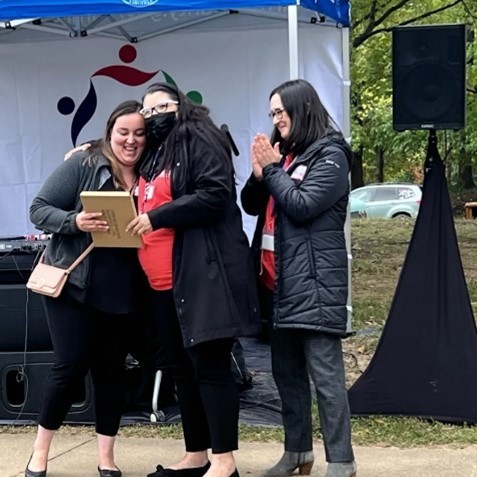 We are fortunate to have so many dedicated partners in Fairfax County who share our work and vision for helping our community thrive. Recently, at the “This Is Us” Wellness and Recognition Event, the Northern Virginia Family Services, SafeSpot, and The Women’s Center were recognized for their outstanding partnerships with Domestic and Sexual Violence Services.
We are fortunate to have so many dedicated partners in Fairfax County who share our work and vision for helping our community thrive. Recently, at the “This Is Us” Wellness and Recognition Event, the Northern Virginia Family Services, SafeSpot, and The Women’s Center were recognized for their outstanding partnerships with Domestic and Sexual Violence Services.
 Is someone gaslighting (a form of psychological abuse where a partner uses manipulation, deception, and control to make you question your memories, your perception of reality, and your sanity) you? Find out how to recognize this form of emotional abuse and what to do if it’s happening to you.
Is someone gaslighting (a form of psychological abuse where a partner uses manipulation, deception, and control to make you question your memories, your perception of reality, and your sanity) you? Find out how to recognize this form of emotional abuse and what to do if it’s happening to you.
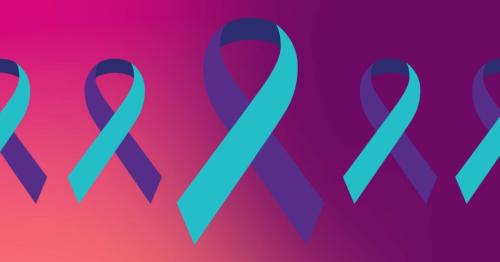 Did you know: There’s a strong connection between sexual assault and suicide. This probably isn’t surprising given that a sexual assault can leave more than physical scars; there are often psychological and emotional effects, too, including panic attacks, sleep disorders, and self-harm. To cope with the trauma of an assault, survivors can dissociate or find other more damaging and permanent ways to escape the pain. Find out more about the intersection of sexual assault and suicide, Suicide Prevention Month, and ways you can help.
Did you know: There’s a strong connection between sexual assault and suicide. This probably isn’t surprising given that a sexual assault can leave more than physical scars; there are often psychological and emotional effects, too, including panic attacks, sleep disorders, and self-harm. To cope with the trauma of an assault, survivors can dissociate or find other more damaging and permanent ways to escape the pain. Find out more about the intersection of sexual assault and suicide, Suicide Prevention Month, and ways you can help.
 A trigger is a reminder of a past trauma. This reminder can cause a person to feel overwhelmed, sadness, anxiety, or panic. It may also cause someone to have flashbacks. A flashback is a vivid, often negative memory that may appear without warning. It can cause someone to lose track of their surroundings and “relive” a traumatic event. Find out more about what causes triggers and how to manage them.
A trigger is a reminder of a past trauma. This reminder can cause a person to feel overwhelmed, sadness, anxiety, or panic. It may also cause someone to have flashbacks. A flashback is a vivid, often negative memory that may appear without warning. It can cause someone to lose track of their surroundings and “relive” a traumatic event. Find out more about what causes triggers and how to manage them.
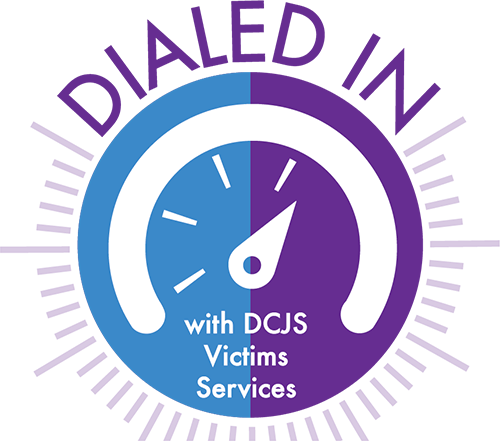 Recently, Domestic and Sexual Violence Services staff Keesha Coke, assistant division director; Andrea Nunes-Gardner, Crisis Response Services program manager; Melody Vielbig, Clinical Services program manager; and Patti Conway, financial specialist in the Department of Family Services, were guests on Dialed In with DCJS Victim Services, a podcast about Virginia’s victim services. On the hour-long episode, they discussed their secrets to successful grant management, the important role collaboration plays in their organizational success, and how they employ strategic planning to stay focused on the impact of their work and to be intentional with the resources DSVS uses and the services it provides.
Recently, Domestic and Sexual Violence Services staff Keesha Coke, assistant division director; Andrea Nunes-Gardner, Crisis Response Services program manager; Melody Vielbig, Clinical Services program manager; and Patti Conway, financial specialist in the Department of Family Services, were guests on Dialed In with DCJS Victim Services, a podcast about Virginia’s victim services. On the hour-long episode, they discussed their secrets to successful grant management, the important role collaboration plays in their organizational success, and how they employ strategic planning to stay focused on the impact of their work and to be intentional with the resources DSVS uses and the services it provides.
 Reproductive coercion--when your partner won’t let you see your doctor, sabotages your birth control, forces you to have sex without protection, or threatens your pregnancy--is a type of sexual violence. Learn more about what reproductive coercion looks like and where you can go for support if you’re being impacted by it.
Reproductive coercion--when your partner won’t let you see your doctor, sabotages your birth control, forces you to have sex without protection, or threatens your pregnancy--is a type of sexual violence. Learn more about what reproductive coercion looks like and where you can go for support if you’re being impacted by it.
 Online (or digital) dating abuse--when a partner uses technology, such as a smartphone, social media, a tracking app, or another form of technology, to threaten, harass, and intimidate the person they're dating—is becoming more common. In fact, abuse prevention advocates report a significant uptick in the number of people, particularly teenage girls, who describe digital dating abuse in their relationships. Learn what digital abuse looks like and how to stay safe.
Online (or digital) dating abuse--when a partner uses technology, such as a smartphone, social media, a tracking app, or another form of technology, to threaten, harass, and intimidate the person they're dating—is becoming more common. In fact, abuse prevention advocates report a significant uptick in the number of people, particularly teenage girls, who describe digital dating abuse in their relationships. Learn what digital abuse looks like and how to stay safe.
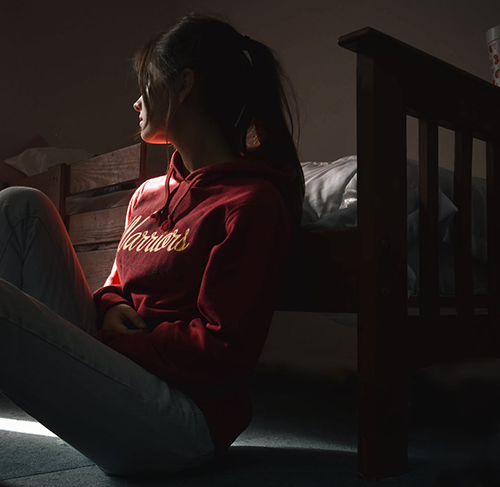 Victim blaming happens when a victim or survivor of sexual violence is held partially or completely responsible for the harm they experienced. It is a symptom of rape culture, in which our society minimizes the severity of sexual violence and normalizes attitudes and beliefs that defend acts of sexual violence. Victims of other violent crimes or health crises do not have to explain what they did to become victimized, but victims of sexual violence are too often forced to defend their actions leading up to an experience of sexual violence. This contributes to an environment where survivors who share their stories are blamed, disbelieved, and shamed.
Victim blaming happens when a victim or survivor of sexual violence is held partially or completely responsible for the harm they experienced. It is a symptom of rape culture, in which our society minimizes the severity of sexual violence and normalizes attitudes and beliefs that defend acts of sexual violence. Victims of other violent crimes or health crises do not have to explain what they did to become victimized, but victims of sexual violence are too often forced to defend their actions leading up to an experience of sexual violence. This contributes to an environment where survivors who share their stories are blamed, disbelieved, and shamed.
Safety Planning with Pets
 Nearly 50% of survivors of interpersonal violence report they delay leaving a dangerous situation because they have no way to keep their pet safe. If you are in an unhealthy relationship and have pets in your home, it can be a good idea to make your pets part of your safety plan. Follow these suggestions to ensure all your loved ones have a path to safety.
Nearly 50% of survivors of interpersonal violence report they delay leaving a dangerous situation because they have no way to keep their pet safe. If you are in an unhealthy relationship and have pets in your home, it can be a good idea to make your pets part of your safety plan. Follow these suggestions to ensure all your loved ones have a path to safety.
What to Do If You’re Being Stalked
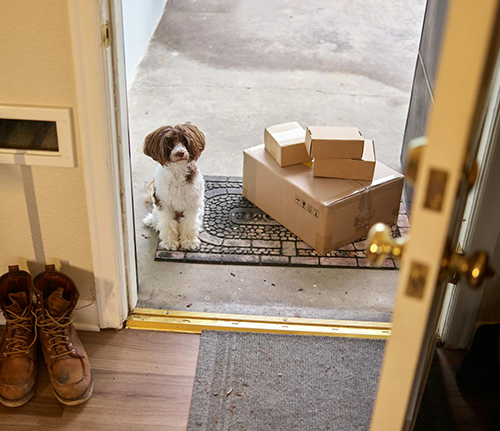 Stalkers are unpredictable and can be dangerous. You can’t control their behavior, but you should feel empowered to take steps to keep yourself, your family, and your other loved ones safe. Follow these eight tips.
Stalkers are unpredictable and can be dangerous. You can’t control their behavior, but you should feel empowered to take steps to keep yourself, your family, and your other loved ones safe. Follow these eight tips.
5 Ways for Teens to Be a Healthy Bystander
 By building teens' abilities to identify and respond to unhealthy relationships, we can encourage our young people to interrupt the cycle of violence through bystander intervention. Learn more.
By building teens' abilities to identify and respond to unhealthy relationships, we can encourage our young people to interrupt the cycle of violence through bystander intervention. Learn more.
The Domestic Violence Action Center’s Ayaan Ali Wins Juvenile & Domestic Relations District Court Partner Award
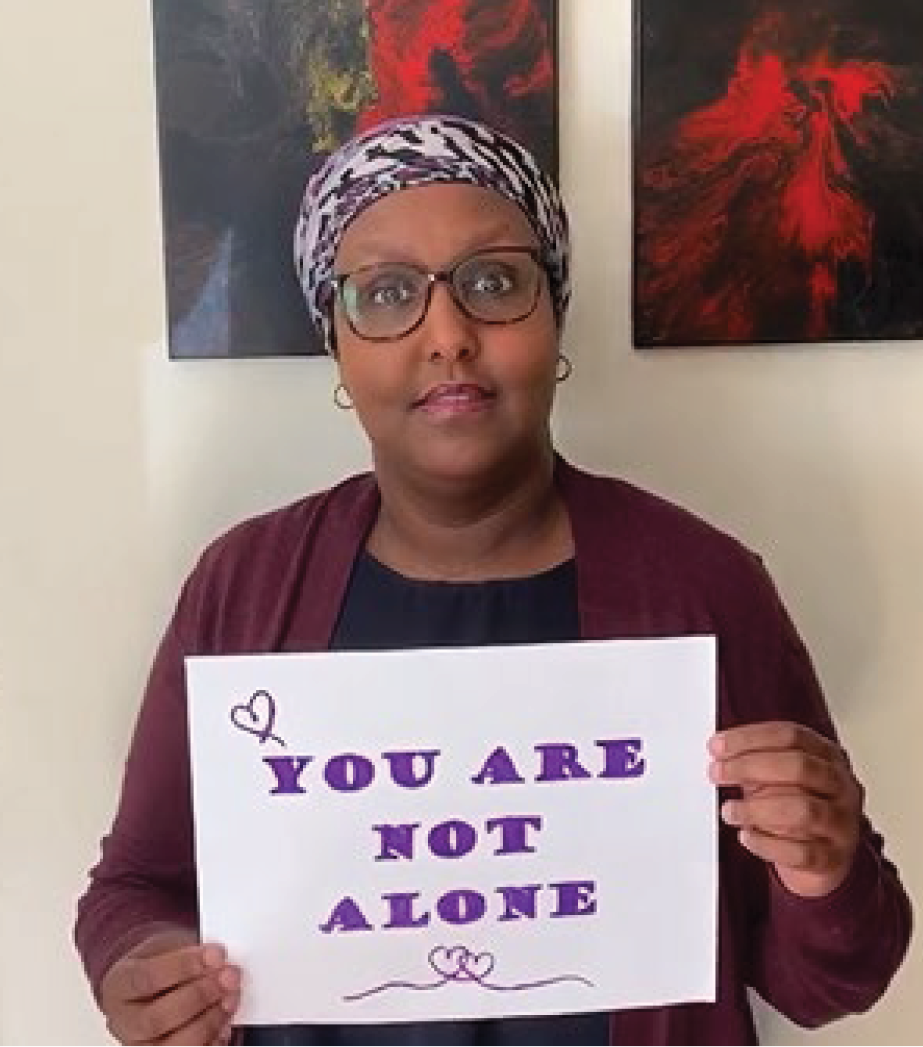 Ayaan Ali, victim advocate with the Domestic Violence Action Center (DVAC), received the Fairfax County Juvenile & Domestic Relations District Court (JDRDC) Partner Award. The award was established to honor the partnerships that exist between JDRDC and its neighbors and to celebrate the community efforts which enhance the mission of the agency. Learn more.
Ayaan Ali, victim advocate with the Domestic Violence Action Center (DVAC), received the Fairfax County Juvenile & Domestic Relations District Court (JDRDC) Partner Award. The award was established to honor the partnerships that exist between JDRDC and its neighbors and to celebrate the community efforts which enhance the mission of the agency. Learn more.
County Conversation Podcast: Unpacking Gender Initiative
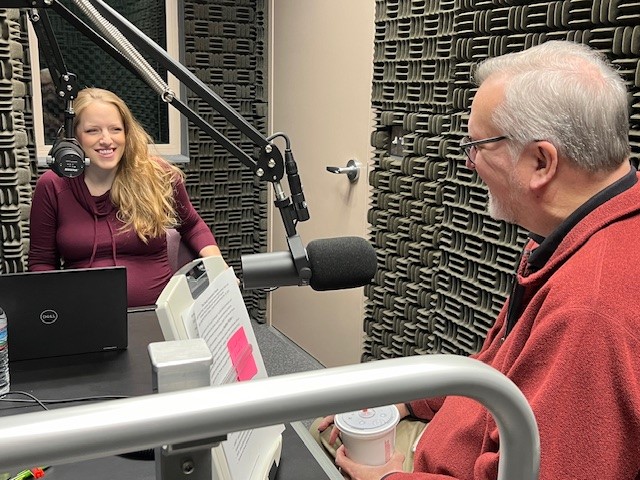 The messages we are taught about gender can affect our relationships with ourselves, our loved ones, and the community. On this County Conversation podcast episode, Heather Potter, counselor with Domestic and Sexual Violence Services’ Anger & Domestic Abuse Prevention and Treatment program, and host Jim Person discuss the impact gender roles and stereotypes have on everyone and how this knowledge can help us prevent violence.
The messages we are taught about gender can affect our relationships with ourselves, our loved ones, and the community. On this County Conversation podcast episode, Heather Potter, counselor with Domestic and Sexual Violence Services’ Anger & Domestic Abuse Prevention and Treatment program, and host Jim Person discuss the impact gender roles and stereotypes have on everyone and how this knowledge can help us prevent violence.
November is National Homeless Youth Awareness Month
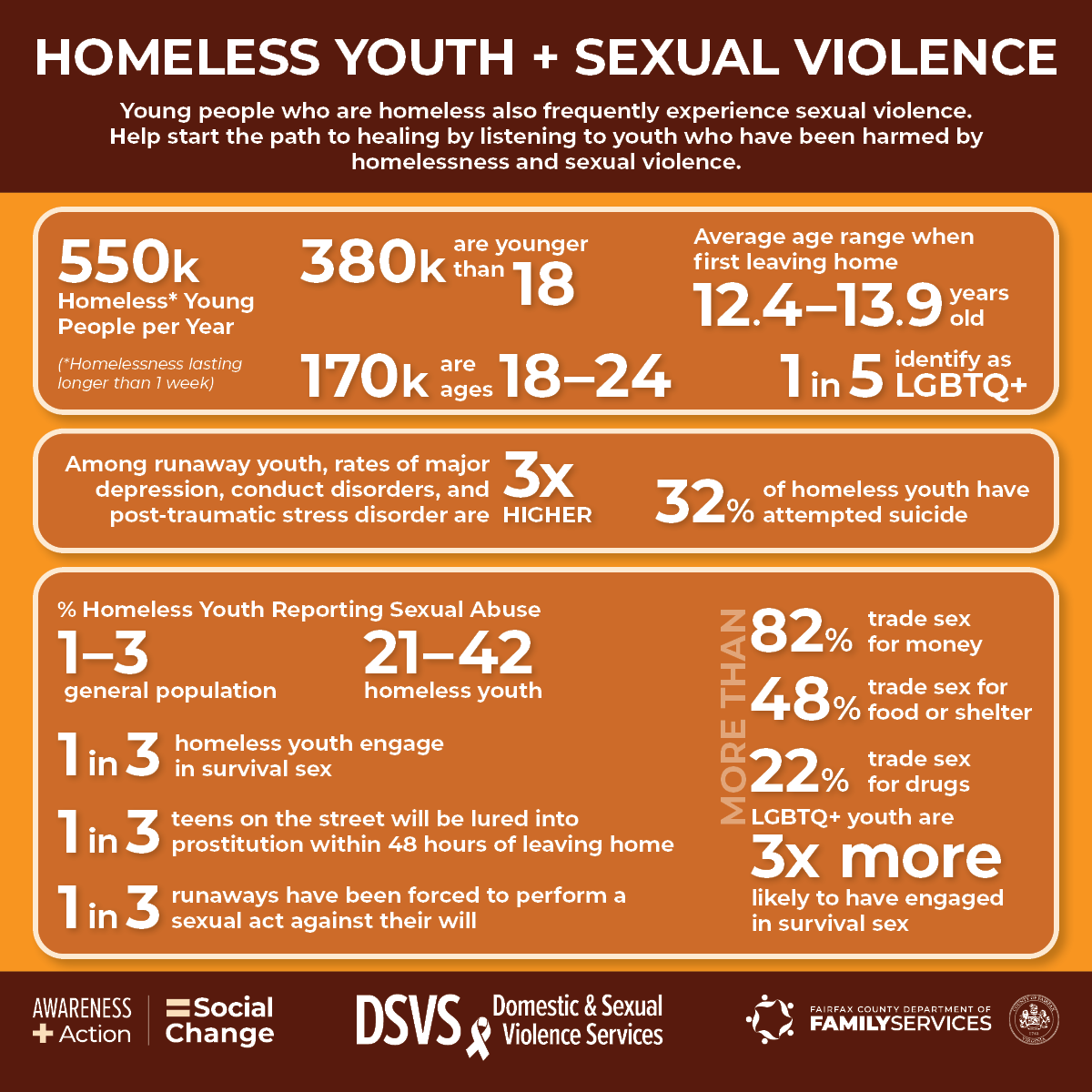 Homelessness and sexual violence are inextricably linked, especially for youth living on the street. Recent research shows young adults experiencing homelessness are as much as 35% more likely to experience sexual violence as housed youth. November is National Homeless Youth Awareness Month, observed every year since 2007 to raise awareness about children and families dealing with homelessness and to educate the public on ways to end the problem. Get more facts about this population.
Homelessness and sexual violence are inextricably linked, especially for youth living on the street. Recent research shows young adults experiencing homelessness are as much as 35% more likely to experience sexual violence as housed youth. November is National Homeless Youth Awareness Month, observed every year since 2007 to raise awareness about children and families dealing with homelessness and to educate the public on ways to end the problem. Get more facts about this population.
5 Safe Voting Tips for Survivors
 As Election Day approaches next week, remember that survivors of intimate partner violence deserve to—and can—participate in all aspects of this country’s political process, including voting, without fearing violence from someone who has caused them harm. Follow these tips to stay safe.
As Election Day approaches next week, remember that survivors of intimate partner violence deserve to—and can—participate in all aspects of this country’s political process, including voting, without fearing violence from someone who has caused them harm. Follow these tips to stay safe.
LGBTQIA+ Language Guide
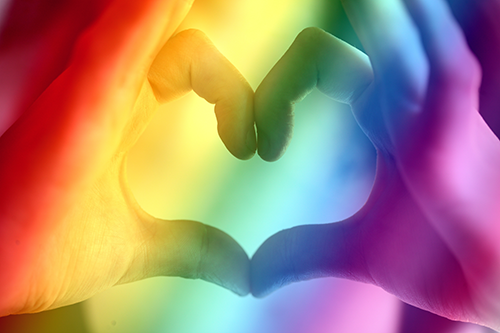 Words matters! And this language guide is an excellent resource to help folks better understand terms related to sexual orientation, gender identity, and expression used in LGBTQIA+ communities. It is not exhaustive, though, and since people use language in different ways, the best practice is always to honor how an individual identifies themselves.
Words matters! And this language guide is an excellent resource to help folks better understand terms related to sexual orientation, gender identity, and expression used in LGBTQIA+ communities. It is not exhaustive, though, and since people use language in different ways, the best practice is always to honor how an individual identifies themselves.
How Fairfax County’s Interpersonal Violence Organizations Stood up to Covid
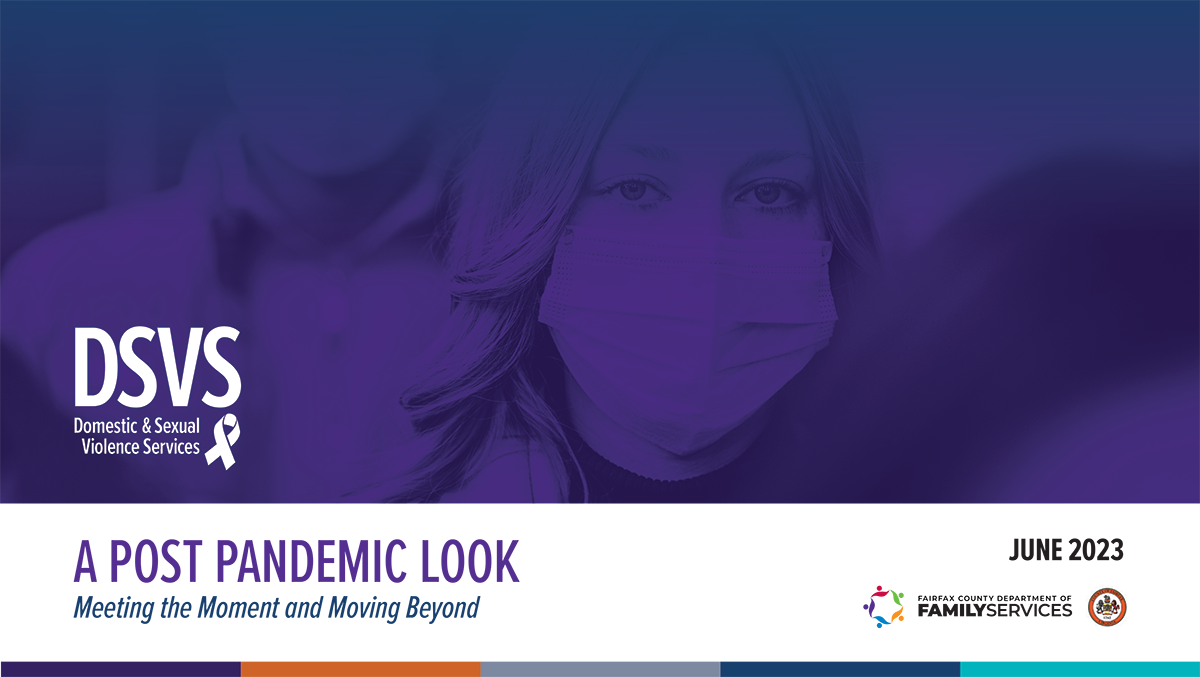 Covid-19 did much more than make the world sick. The global pandemic stretched our health, public health, and scientific resources and exposed gaps, including in those agencies and organizations that support people impacted by interpersonal violence. Fairfax County’s Domestic and Sexual Violence Services division and its partners take a look at the effect of the virus on the community, staffing, and morale in its Meeting the Movement and Beyond: A Post Pandemic Look report.
Covid-19 did much more than make the world sick. The global pandemic stretched our health, public health, and scientific resources and exposed gaps, including in those agencies and organizations that support people impacted by interpersonal violence. Fairfax County’s Domestic and Sexual Violence Services division and its partners take a look at the effect of the virus on the community, staffing, and morale in its Meeting the Movement and Beyond: A Post Pandemic Look report.
What Is Domestic Violence?
 Domestic violence is behavior that harms a current or former spouse or dating partner. It also impacts family members, children, and other people in the home. Domestic violence can happen between people of any gender or sexuality. Learn more about examples of domestic violence.
Domestic violence is behavior that harms a current or former spouse or dating partner. It also impacts family members, children, and other people in the home. Domestic violence can happen between people of any gender or sexuality. Learn more about examples of domestic violence.
The HYPE Project
 This youth-focused, 8-session curriculum teaches participants about intimate partner violence and sexual assault prevention. Through hands-on activities, multimedia, role-play exercises and facilitated discussions, teens will have opportunities to examine various elements of relationships and develop skills to identify and replicate healthy dynamics in interpersonal interactions. Topics are also available as standalone workshops. Learn more about the HYPE Project.
This youth-focused, 8-session curriculum teaches participants about intimate partner violence and sexual assault prevention. Through hands-on activities, multimedia, role-play exercises and facilitated discussions, teens will have opportunities to examine various elements of relationships and develop skills to identify and replicate healthy dynamics in interpersonal interactions. Topics are also available as standalone workshops. Learn more about the HYPE Project.
DSVS Staff on the County Conversation
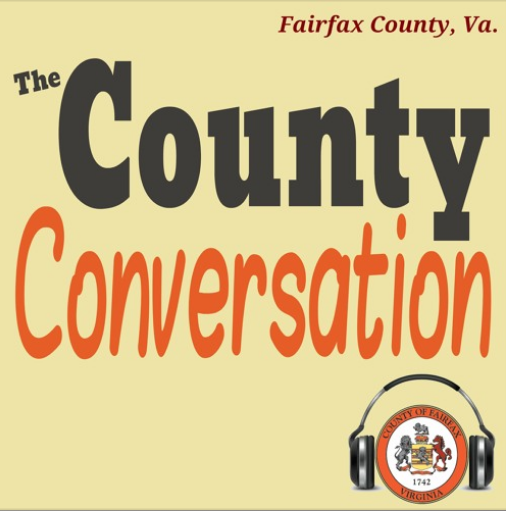 For detailed discussions about Domestic and Sexual Violence Services’ resources and support for survivors of gender-based violence, check out Domestic and Sexual Violence Services on the County Conversation Podcast.
For detailed discussions about Domestic and Sexual Violence Services’ resources and support for survivors of gender-based violence, check out Domestic and Sexual Violence Services on the County Conversation Podcast.
Pronouns: Why Do They Matter?
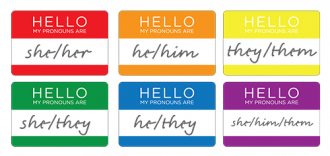
Language matters. Language is a tool that helps us convey meaning and connect. We use words to communicate, characterize, and describe everything around us. Nothing may be more personal than the words people use to refer to us through our names and pronouns, which represent key elements of our identity.
We use pronouns and names frequently in our everyday written and verbal communication. Most of us have learned from a young age to use “she/her” for girls and “he/him” for boys. As our society has progressed in understanding gender identity, our language has also evolved. Learn how to model the use of pronouns and why this practice shows respect.
Fairfax County’s Red Flag Law Encourages People to Speak Up: Prevent a Gun Tragedy
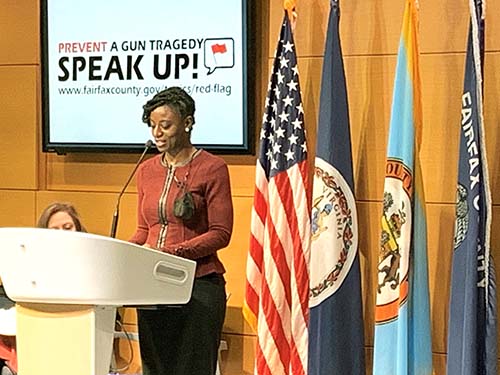 On Monday, Dec. 13, 2021, county and community leaders, including Domestic and Sexual Violence Services’ Angela Yeboah, shared information and impactful stories of the Red Flag Law’s use to prevent gun violence and issued a call-to-action for the community to contact authorities who can act quickly to prevent tragedies. Check out this video to learn more.
On Monday, Dec. 13, 2021, county and community leaders, including Domestic and Sexual Violence Services’ Angela Yeboah, shared information and impactful stories of the Red Flag Law’s use to prevent gun violence and issued a call-to-action for the community to contact authorities who can act quickly to prevent tragedies. Check out this video to learn more.
Hope Cards Now Offered in Fairfax County
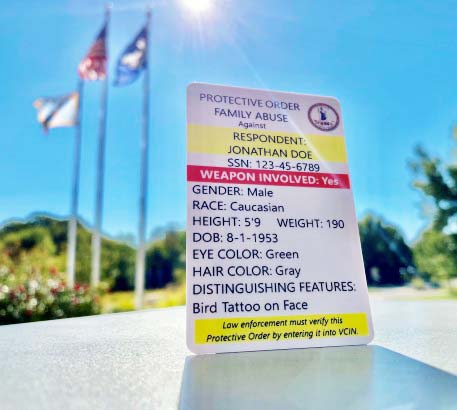
Fairfax County now participates in the Hope Card program, a way to enforce a civil protective order and a handy resource for victims of family abuse. A Hope Card is a laminated wallet-sized card that contains all the essential information of an existing, permanent civil protection order.
Hope Cards have been around for a while but they're a new resource in Fairfax County for victims of family violence, intimate partner violence, stalking or sexual assault. The Hope Card can reduce the time on scene for officers responding to incidents of protection order violations, allow officers to verify if there is a valid protective order in place and can provide a sense of security to victims. It also helps keep officers safer by informing law enforcement about weapons involved in the incident resulting in a protective order. Learn more about the Hope Card.
Talking About It Matters: Domestic Violence in the LGBTQ+ Community
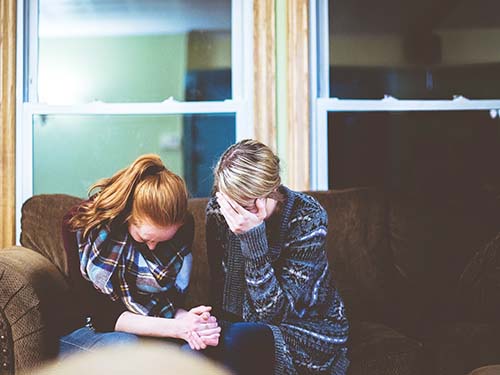 Though it might not be clear from mainstream media, domestic violence is not limited to heterosexual relationships and can affect individuals of all sexual orientations and genders.
Though it might not be clear from mainstream media, domestic violence is not limited to heterosexual relationships and can affect individuals of all sexual orientations and genders.
In fact, recent research shows intimate partner violence within the LGBTQ+ community occurs at a rate equal to or even higher than that of members of the heterosexual community.
Learn more about domestic violence in the LGBTQ+ community or call the Domestic and Sexual Violence 24-Hour Hotline 703-360-7273.
Video: Domestic and Sexual Violence Services Supports Victims of Gender-Based Violence
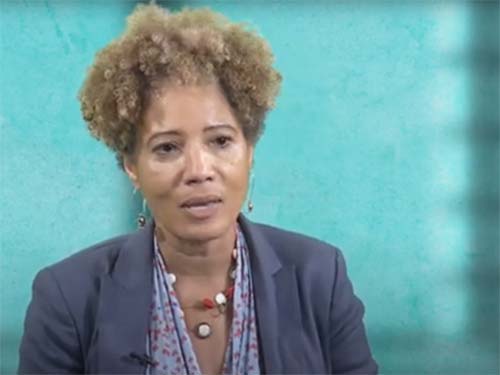 Domestic violence and sexual violence are two separate issues and how they are addressed is different, too. Learn more about how the Department of Family Services’ Domestic and Sexual Violence Services division supports survivors of all forms of gender-based violence.
Domestic violence and sexual violence are two separate issues and how they are addressed is different, too. Learn more about how the Department of Family Services’ Domestic and Sexual Violence Services division supports survivors of all forms of gender-based violence.
Note: This video contains images that may be disturbing or triggering.
Learn about sexual assault, domestic violence and how Domestic and Sexual Violence Services supports survivors. Get information about DSVS resources by calling the Domestic and Sexual Violence 24-Hour Hotline 703-360-7273.
Video: You Are Not Alone
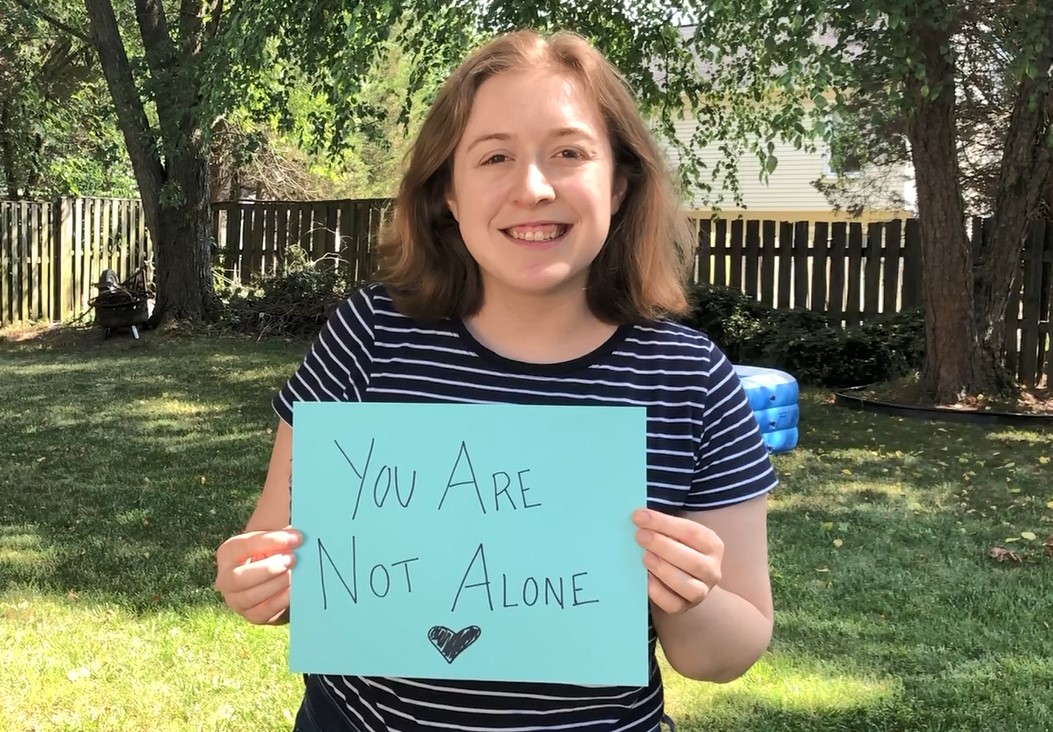 During this national emergency, domestic violence and sexual abuse is on the rise by at least 20%. Often stuck at home with their abusers, victims may feel trapped and alone. But there is help still available. Fairfax County’s Domestic and Sexual Violence Services provides options and services for victims 24 hours a day, 7 days a week. We created this video to spread the word - “You Are Not Alone.
During this national emergency, domestic violence and sexual abuse is on the rise by at least 20%. Often stuck at home with their abusers, victims may feel trapped and alone. But there is help still available. Fairfax County’s Domestic and Sexual Violence Services provides options and services for victims 24 hours a day, 7 days a week. We created this video to spread the word - “You Are Not Alone.
Note: This video contains images that may be disturbing or triggering.
Learn about sexual assault, domestic violence and how Domestic and Sexual Violence Services supports survivors. Get information about DSVS resources by calling the Domestic and Sexual Violence 24-Hour Hotline 703-360-7273.
The Intersection of Gender-Based Violence and Economics
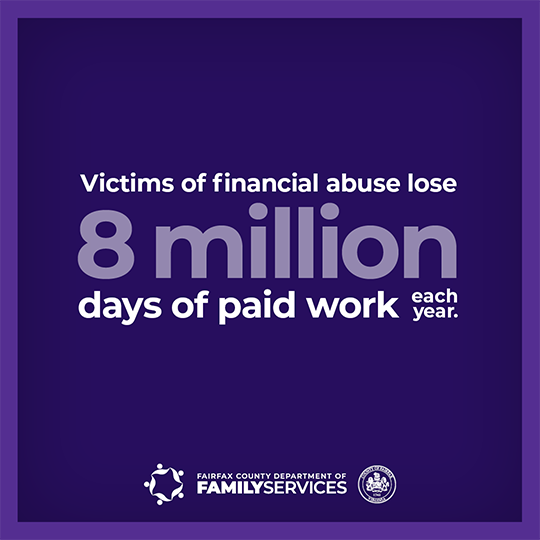 Ending gender-based violence requires us to see all the aspects of the issue. Often, when we think of intimate partner violence, we envision only bruises or broken bones—things we can see—or perhaps verbal abuse. But domestic violence takes many forms, including financial abuse, a subject that is often overlooked.
Ending gender-based violence requires us to see all the aspects of the issue. Often, when we think of intimate partner violence, we envision only bruises or broken bones—things we can see—or perhaps verbal abuse. But domestic violence takes many forms, including financial abuse, a subject that is often overlooked.
The truth is personal safety and economic security are inextricably linked for victims of domestic violence. Research from the Centers for Financial Security shows financial abuse is present in 99 percent of domestic violence cases. Learn more about the intersection of domestic violence and financial abuse, call the Domestic and Sexual Violence 24-Hotline 703-360-7273.

